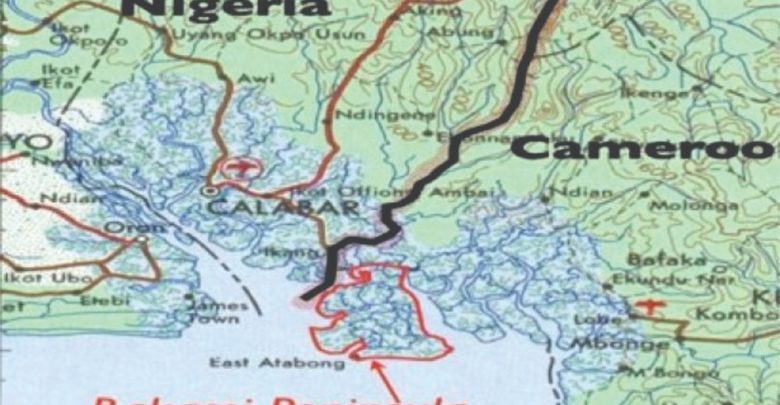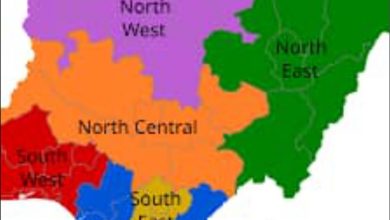The Green Tree Agreement For Bakassi – 18 Years After (Part 1)

How time flies! It is amazing that approximately 18 years have passed since this international deal was brokered. Not a few may have forgotten that expression “Green Tree Agreement” that brought an end to that impending war between Nigeria and Cameroun, which by extension would indirectly have meant hostilities between Nigeria and France to whose apron strings Cameroun is eternally tied.
Although the processes was suspected to be marred with internal mischief and international conspiracy, looking back at what possibly could have been had the crisis lingered beyond where it ended at the time, we still can appreciate, although with great reservations, the efforts of masterminds of the famous or infamous amity between Nigeria and Cameroun. Back home, former President Olusegun Obasanjo was the epicentral force of subtle and subdued antagonism.
In plainer terms, The Green Tree Agreement was the formal treaty that brought an end to the Nigeria-Cameroun border dispute over the oil-rich Bakassi peninsula. Disputes over the area can be traced back to as far as 1913, 1931, 1981, 1994 and 1996 armed clashes between the two contesting nations. However, at long last, the matter was referred to the International Court of Justice, and on 10th October, 2002, that Court ruled in favour of Cameroun. This means that that disputed area of Bakassi officially and geographically now belongs to Cameroun.
But why the name, Green Tree? It is important to state that the name Green Tree, is taken after a place or borough in Allegheny, Pennsylvania, a suburb of Pittsburgh in the United States of America. The area was created in 1793. After series of meetings were held here on the final resolution to handover the Bakassi Peninsula to Cameroun Republic, the word Green Tree came into wider use or limelight amongst Africans as the place where the peace talks were held.
The Green Tree Agreement has as much to do with Cross River State as it has to do with the Niger Delta region and Nigeria at large, hence its consideration on this page. Ever since that historic and controversial diplomatic conspiracy was orchestrated between Nigeria and the Cameroonian and French power, many Nigerians may have forgotten the details and many more Nigerians were never born then, which informs a replay of that facet of history in this edition of the paper.
Although a consensus was reached in 2002, it was not until June 12, 2006 that President Olusegun Obasanjo and his Cameroonian counterpart, President Paul Biya, officially signed the Green Tree Agreement. This mutual engagement was followed up with the gradual twin act of withdrawal of troops and official transfer of full authority over the area to the Cameroun government. Details of the procedure or processes included the first three months or 60 days granted Nigeria for the withdrawal of her troops and an additional 30 days to cover exigencies; while Nigeria was still allowed to temporarily maintain her civil administration and police in Bakassi for another two years to check possible breakdown of order.
To ensure compliance, an ad hoc committee comprising representatives from Cameroon, Nigeria, the United Nations, United States of America, France, Germany and the United Kingdom was constituted to monitor proceedings and actual implementation of recommendations. It would take about seven years later for the United Nations to once again acknowledge and commend the peaceful transition of authority over the Bakassi between the two sister African nations.
The signing of the Greentree Agreement by Chief Obasanjo was seen and received with mixed feelings by some analysts who suspected some foul play, some blaming Obasanjo for being too much in a hurry, unilateral and cheap or capitulating too easily in his discussions and final concession on the issue. By geography and ancestry, it was believed that that parcel of land actually belonged to Nigeria, but superior logic of the International Court of Justice decided that it must go to Cameroun. There are specious claims that, although some may have claimed citizenship wherever they chose, there were and still are more Nigerians around the Bakassi than in Cameroon and that the region is more natural and habitable to Nigerians than their Cameroon neighbours whom the judgement favoured.
The epochal though controversial Greentree Agreement was signed under Kofi Annan as Secretary-General of the UN. His Committee had set modalities and time schedule for the implementation of the judgement delivered by ICJ in 2002. That momentous agreement signalled the determination of both countries to discard the past as a great price they both had to pay and move forward with stronger synergy for future opportunities and possible collaborations across their continental borders.
Perhaps judged by their psychology and manifest attitudinal dispositions since the deal was struck, some analysts still doubt if Cameroun would have acted like Nigeria had the judgement gone the other way round. The success of that programme was also a testimony to how the two nations respect the Rule of Law. The Greentree resolution also set up an innovative template for the UN in international conflict management across the world.
In marking the second anniversary of that armistice, the eight Secretary-General of the UN who succeeded Kofi Annan and served as from January 2007 to 2016, Ban Ki Moon, had in commending both Nigeria and Cameroon for their celebrated understanding described the event as “Triumph of the Rule of Law!” and therefore saw in it a sterling example for other nations in conflicts over territories.
“I wish to pay tribute to the foresight and political will demonstrated by the Governments and peoples of the Republic of Cameroon and the Federal Republic of Nigeria. It is, in particular, their patience and perseverance that have made this remarkable experiment, and today’s ceremony, possible. Furthermore, the success of the initiative has provided the world with a model for the peaceful resolution of sensitive disputes”, the South Korean politician and diplomat had declared.
18 years since after that ratification, the main and recurrent issue on ground centre around allegations that the Cameroonian Government, through her military, are alleged to be hostile to Nigerians resident in Cameroon or doing business within the territory, hence flouting, as it were, the operational principles that were supposed to govern their mutual relations. Some aggrieved may have been forced by the unpleasant attitudes and situations so created to say that it were as if both countries were still at war with each other, through guerrilla tactics.
Recall that in his address, the UN secretary has said that “The final transfer of authority in the Bakassi peninsula opens a new chapter in the relationship between the two countries in addressing residual issues”, further expressing confidence that “both Governments will show the same resolve and dedication to making sure that the human rights of the local populations affected by this historic event continue to be protected”.
He then envisioned: “Let me convey a final message of hope for sustainable peace and progress in the Bakassi peninsula, and in Cameroon and Nigeria as a whole. Whether Cameroonians or Nigerians, the people of Bakassi can be assured of the continued support of the United Nations as they work with their Governments and their communities to build stable and prosperous future generations for generations to come”. That was the expectation, at least!
But there are more specific internal issues that should bother the Nigerian government and stakeholders in the Niger Delta. If the entire Bakassi is said to be superfluously endowed with oil and the remaining area that belongs to Nigeria is naturally and fortuitously inclusive, to what benefit has that been to the country since 2002? What is life like in Bakassi today? What about the refugees who were relocated to various parts of the country?
In spite of the commendations, there are Nigerians who blame Chief Olusegun Obasanjo for the way Bakassi was given away. In subsequent editions on this matter, Crystal Express shall try to dig deeper into some lingering issues and find satisfactory answers to some questions as part of our expository and explorative narrative on the Niger Delta Region. Watch out!




